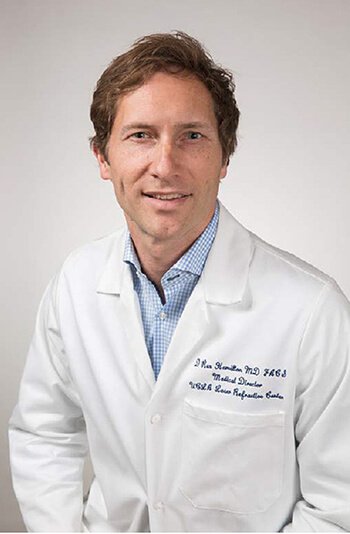Your Pacific Palisades LASIK experience begins with Rex Hamilton, MD

- Board Certified Ophthalmologist
- Fellowship “Specialty” Trained in Cornea/Refractive Surgery
- Specializes in Premium Cataract Surgery and Refractive Surgery
- Fellow of the American Academy of Ophthalmology
- Fellow of the American College of Surgeons
- Has performed over 12,000 cataract and refractive surgery procedures
- Served as Clinical Professor and Director, UCLA Laser Refractive Center, Stein Eye Institute for 15 years (2003 – 2018)
- Performed First SMILE (Small Incision Lenticule Extraction: “Flapless LASIK”) Refractive Surgery procedure on the West Coast (March 2017)
- Performed First Extended Depth of Focus (“Symfony”) Lens Implantation for Cataract Surgery in Los Angeles (August 2016)
- First surgeon at UCLA Stein Eye Institute to utilize Intraoperative Aberrometry (ORA) for Cataract Surgery (2012)
- First surgeon at UCLA Stein Eye Institute to perform Laser Cataract Surgery (2010)
- First surgeon at UCLA Stein Eye Institute to implant an Accommodative Intraocular Lens (“Crystalens”) for Cataract Surgery (2004)
- First surgeon at UCLA Stein Eye Institute to perform Custom Wavefront Guided LASIK (2003)
- Authored more than 40 peer-reviewed scientific journal articles and book chapters
- Delivered more than 50 presentations at national and international scientific meetings
- Delivered more than 200 scientific lectures in the United States and around the world
- Voted one of 300 Premier Refractive Cataract Surgeons in US, Ocular Surgery News (2016)
- Member of Refractive Cataract Surgery Clinical Committee for American Society of Cataract and Refractive Surgery (ASCRS) since 2012
 If you are one of many Californians in Pacific Palisades interested in improving your vision, you can learn about LASIK on this website. If you would prefer to speak to someone, simply contact our office and speak with one of our patient counselors who can provide extensive patient education, explain the process and help arrange financing.
If you are one of many Californians in Pacific Palisades interested in improving your vision, you can learn about LASIK on this website. If you would prefer to speak to someone, simply contact our office and speak with one of our patient counselors who can provide extensive patient education, explain the process and help arrange financing.
To better understand LASIK, click on the What Is LASIK page where you will find detailed information about the LASIK procedure. An immense amount of new vision correction technology has been introduced over recent years, so we understand that it can be difficult for patients to determine for which procedure they might be best suited. Additional detailed information about surgery can also be found in The LASIK Experience and Advanced LASIK sections where you can learn about the advantages of Custom and Blade-Free LASIK.
schedule a consultation
Questions to ask your LASIK eye surgeon BEFORE surgery
- How many vision correction procedures have you performed?
- How many laser vision correction procedures have you performed?
- What type of excimer laser will you be using for my surgery?
- Why did you choose this laser?
- Do I have a good chance at achieving 20/20 vision?
- What happens if I require an enhancement?
- What is your educational background and medical school training?
- What would your colleagues say about you?
- What are my biggest risks with LASIK eye surgery?
- How many patients have you turned away?
LASIK Candidacy
Not every person is a candidate for LASIK eye surgery. We realize that every eye is very unique. No two corneal maps are the same. Each is just as distinctive as DNA or a fingerprint. Visit our LASIK Candidacy page for more information about who may be and may not be a good candidate for laser vision correction. After a preliminary screening visit, a comprehensive eye examination is necessary to make the final candidacy determination. This extensive diagnostic evaluation is the first step in creating a positive outcome to achieve your personal best vision.
schedule a consultation
Common LASIK Questions
Q: How does the laser work?
The excimer laser uses a cold light beam to sculpt the cornea’s surface to the desired shape by removing a microscopic amount of tissue, correcting nearsightedness, farsightedness and/or astigmatism.
Q: Does it hurt?
The cornea is easily numbed with eye drops during the procedure. Most patients may experience a pressure sensation for 15 to 20 seconds during the procedure but say they have little to no discomfort both during and after LASIK.
Q: Are both eyes done at the same time?
Some patients may prefer to have each eye done on different days. In most cases, however, both eyes are done on the same day. This avoids the period of imbalance that occurs if one eye still needs correction while the other one doesn’t.
Q: Can LASIK successfully treat nearsightedness, farsightedness, and astigmatism?
Yes, LASIK can successfully treat all three of these vision conditions.
Q: If I have cataracts can LASIK fix this problem?
No, LASIK is not an appropriate surgery for cataracts. LASIK is performed on the front surface (cornea) of the eye. Cataract surgery is the replacement of the cloudy lens inside the eye with an implant. To understand more about lens implant options that can help you see at various distances after cataract surgery, visit our pages on Multifocal and Accommodating IOLs.
Q: Does insurance cover LASIK eye surgery?
Vision correction surgery is rarely covered by medical insurance. If you have had severe medical problems with your eyes such as corneal transplantation, there is a slight chance that it may be covered. Visit our Patient Financing page for more information on payment options.
Q: How long will the surgery take?
We typically ask the patient to arrive one hour prior to the scheduled surgery time to ensure that we have answered all of your questions and to perform any tests required for final surgical planning. The actual surgical time is typically less than 10 minutes per eye.
Q: Can I drive home after the surgery?
No, you will need to arrange for a ride home. Because it is likely that you’ll have light sensitivity and some discomfort for 3 -4 hours after your procedure, it is best that you rest at home that evening.
Q: How long will I need to take off work?
Most patients return to work within one to three days.
Q: Will LASIK interfere with my lifestyle?
Active sports should be postponed for two weeks or until the eye is fully healed, unless protective eyewear is approved by the surgeon. Swimming, hot tubs and saunas should be avoided for three weeks. After a full recovery, normal activity can resume, and the ability to play sports without glasses makes them more enjoyable for many patients.
Q: How long will the correction last?
LASIK is a permanent procedure. In some cases, an enhancement procedure may be required. Some patients’ eyes may change throughout their lifetime, which can happen with glasses or contact lenses as well.
schedule a consultation
If you have any questions, do not hesitate to call us.
Hamilton Eye Institute
8900 Wilshire Blvd Suite 300A
Beverly Hills, CA 90211
424-732-2020
Lasik Surgery in Pacific Palisades
